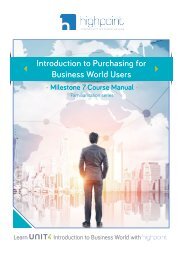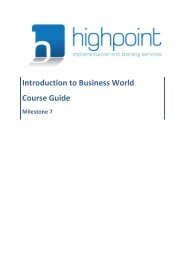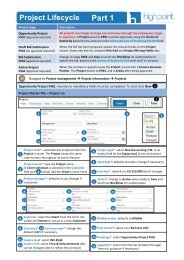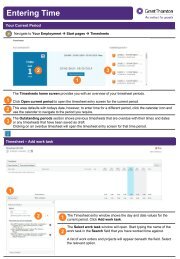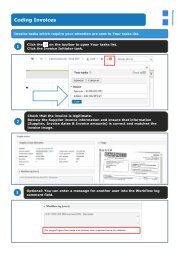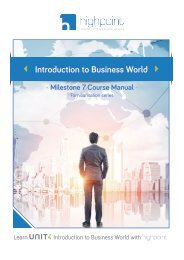HP TrainTheTrainer Presentation
Create successful ePaper yourself
Turn your PDF publications into a flip-book with our unique Google optimized e-Paper software.
Train the Trainer
Discussion in groups<br />
Group Discussion<br />
What are the challenges to training<br />
Business World?<br />
2
Course Objectives<br />
At the end of this module you will be able to:<br />
• Understand the science behind learning<br />
Course<br />
Objectives<br />
• Deliver an enhanced learning session<br />
• Have some useful tips for training<br />
• Understand the importance of feedback<br />
3
Group Discussion<br />
Great Experience<br />
Bad Experience
Andragogy<br />
Malcom Knowles<br />
1967<br />
“Andragogy (is) the art and science of helping<br />
adult learn…based on certain crucial<br />
assumptions about the difference between<br />
children and adults as learners”<br />
Knowles, 1968
Need to Know<br />
Motivation<br />
Self Concept<br />
The Adult<br />
Learner<br />
Context<br />
Required<br />
Life Experience<br />
Readiness to<br />
learn
Andragogy<br />
Malcom Knowles<br />
1967<br />
Motivation<br />
As a person matures the motivation to learn is increasingly internal<br />
•Personal responsibility is important<br />
•Adults want to meet the requirements of their lives<br />
•Adults wants to be successful
Andragogy<br />
Malcom Knowles<br />
1967<br />
Context<br />
Required<br />
As an individual matures, his or her time perspective moves from one<br />
of postponed application to one of immediate application<br />
• The shift is from subject centredness to problem centredness<br />
• Adults often enjoy solving problems
Andragogy<br />
Malcom Knowles<br />
1967<br />
Life Experience<br />
As a person matures, he or she accumulates a growing wealth of<br />
experiences that is utilized to make sense of the environment<br />
• Adults are experiential learners<br />
• Adults may know more than the teacher
Andragogy<br />
Malcom Knowles<br />
1967<br />
Self Concept<br />
As a person matures, his or her self concept moves from being a<br />
dependent personality toward one of being a self-directed human<br />
being<br />
• Adulthood is where this transition occurs<br />
• Adults want to be treated like adults!
Andragogy<br />
Malcom Knowles<br />
1967<br />
Need to Know<br />
Life is busy. Adults are busy. Adults are actively engaged in the process<br />
of life. To take time out of this busy process to learn, adults may ask:<br />
• How will this benefit me?<br />
• What makes learning this worth the effort?
Andragogy<br />
Malcom Knowles<br />
1967<br />
Readiness to<br />
learn<br />
As an individual matures, his or her readiness to learn becomes<br />
oriented to the developmental tasks of social roles<br />
• The content must be relevant<br />
• Life application is critical<br />
• The content must be viewed as legitimate
Andragogy<br />
Malcom Knowles<br />
1967<br />
Andragogy is founded on four principles<br />
An explanation of<br />
why specific things<br />
are taught is needed<br />
Instruction should<br />
be task-oriented and<br />
provide a context for<br />
learning<br />
Instruction should<br />
take into account the<br />
wide range of<br />
different background<br />
of learners<br />
Instruction should<br />
promote selfdirection<br />
and<br />
provide guidance
Course Objectives<br />
Change curve<br />
14
Accelerated Learning<br />
Dave Meier<br />
2000<br />
Written by accelerated learning guru Dave Meier, the book explains an innovative, rapid<br />
instructional design methodology and presents hundreds of practical techniques and ideas to<br />
speed training time and reduce costs, while significantly improving learning and long-term<br />
results. Discover how leading corporations are using A.L. methods to: speed and enhance<br />
learning; greatly reduce course design time; improve retention and job performance; involve<br />
learners at every stage of the process; enhance both classroom and Web-based learning;<br />
create healthier learning environments; build effective learning communities; and, energize<br />
and re-humanize the learning process.<br />
Meier, 2000<br />
The Accelerated Learning Handbook
Learning<br />
Zone<br />
Three<br />
Ways<br />
Learning<br />
Learning<br />
Cycle<br />
Layering<br />
Accelerated<br />
Learning<br />
Promote<br />
Discovery<br />
Facilitation<br />
SAVI<br />
Learning<br />
Mirror Real<br />
Life
VAK learning styles<br />
Make it SAVI<br />
• Sematic – Let’s do it<br />
• Audio – Let’s hear it<br />
• Visual – Let's see it<br />
• Intellectual – Let’s write it down<br />
17
Discussion in groups<br />
Group Discussion<br />
What does this suggest about the way we<br />
train Business World users?<br />
How can we run a SAVI coaching session?<br />
18
VAK learning styles<br />
The learning zone<br />
Self<br />
Actualisation<br />
Self<br />
Esteem<br />
Belonging<br />
Safety<br />
Physical Needs<br />
19
VAK learning styles<br />
The learning zone<br />
In practice, this means that<br />
learners need to be comfortable<br />
and feel safe, part of the team,<br />
and valued in order to be able<br />
to contribute.<br />
Physical Needs<br />
Safety<br />
Belonging<br />
Self Esteem<br />
Self Actualisation<br />
In that strict order.<br />
20
Discussion in groups<br />
The learning cycle<br />
Preparation<br />
<strong>Presentation</strong><br />
Performance<br />
Practise<br />
21
Promote VAK learning discovery styles<br />
Autonomy Mastery Purpose<br />
22
VAK learning styles<br />
Mirror real life<br />
‘As a person matures, he or she<br />
accumulates a growing wealth<br />
of experiences that is utilised to<br />
make sense of the<br />
environment’<br />
23
Discussion in groups<br />
Facilitation<br />
Frame the setting<br />
Prepare<br />
Take control<br />
Uncover insights don’t provide them<br />
Close with impact<br />
24
Controlling the room<br />
Facilitation can present many challenges chief among these are;<br />
• Somebody who is very quiet with little<br />
to no verbal engagement<br />
• Somebody who is very loud allowing<br />
everybody to sit back and let them answer<br />
25
Controlling the room<br />
Group A<br />
Somebody who is very quiet little to no verbal engagement<br />
Group B<br />
Somebody who is very LOUD allowing everybody to sit back and<br />
let them answer<br />
26
The Weather-maker<br />
27
VAK learning styles<br />
Layering<br />
Complex tasks can be broken down.<br />
28
Differentiation<br />
Content Process Reaction
Jargon Busting<br />
Follow these instructions…<br />
Partum pie chart to ikuskizuna what<br />
percentage of the chumba are wearing<br />
llinyn I fyny shoes vs those who are<br />
mhux.<br />
30
Jargon Busting<br />
Follow these instructions…<br />
Partum (Latin) pie chart to ikuskizuna<br />
(Basque) what percentage of the<br />
chumba (Swahili) are wearing llinyn I<br />
fyny (Welsh) shoes vs those who are<br />
mhux (Maltese).<br />
31
Jargon Busting<br />
Follow these instructions…<br />
Create a pie chart to show what<br />
percentage of the room are wearing<br />
lace up shoes vs those who are not<br />
32
Creating a learning culture<br />
Formative informal learning<br />
Information two ways<br />
Think about the journey<br />
Sharing is caring….and learning<br />
Celebrate failure
Learning<br />
Zone<br />
Three<br />
Ways<br />
Learning<br />
Learning<br />
Cycle<br />
Layering<br />
Accelerated<br />
Learning<br />
Promote<br />
Discovery<br />
Facilitation<br />
SAVI<br />
Learning<br />
Mirror Real<br />
Life
Key Indicators<br />
Reading the room<br />
Body posture<br />
Non responsive
Key Solutions<br />
Change the stance<br />
Power of the 5 minute break<br />
Don’t ignore it
Key Challenges<br />
Tortoise and the hare<br />
?<br />
Difficult Questions<br />
Disengagement
Discussion in groups<br />
Group Discussion<br />
What is feedback?<br />
Why is it important?<br />
38
Group Discussion<br />
How can we solve<br />
these problems?<br />
39
What is feedback?<br />
Why is it important?<br />
https://www.surveymonkey.co.uk/r/LF8TZ5L<br />
40




